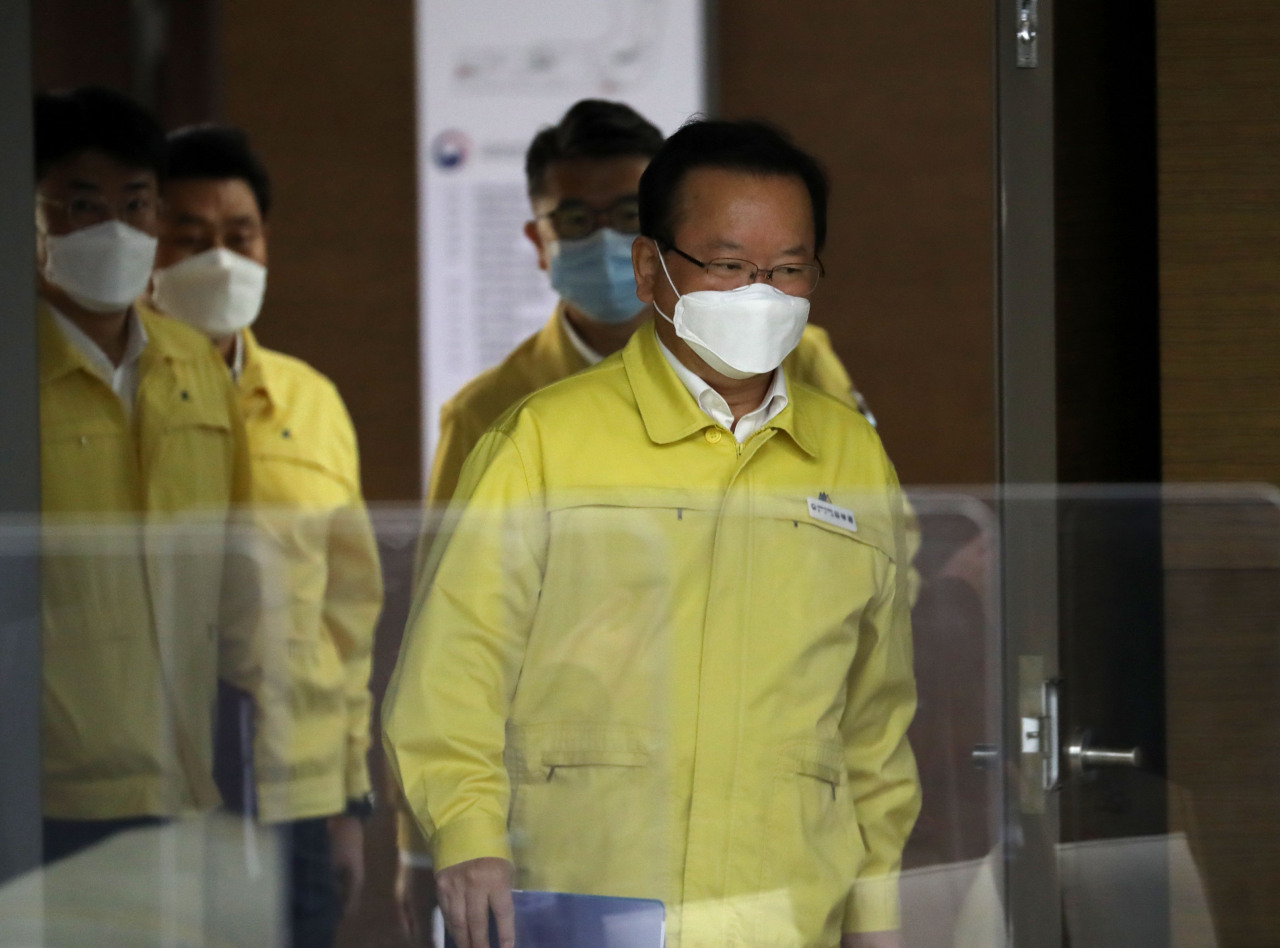S. Korea to cut dosage interval for COVID-19 booster shots on senior citizens
By YonhapPublished : Nov. 17, 2021 - 09:09

South Korea will cut the dosage interval between primary vaccination and COVID-19 vaccine booster shots for senior citizens in a move to curb breakthrough infections and serious cases amid worries over virus upticks, Prime Minister Kim Boo-kyum said Wednesday.
Booster shots for people aged 60 or older and nursing hospital patients can be administered four months after they received their last dose, while those in their 50s can get extra jabs five months after their primary COVID-19 vaccination, Kim said at a COVID-19 response meeting.
A booster shot refers to an extra dose of a vaccine given after the protection provided by the original jabs wanes over time.
Currently, vaccine booster shots are given six months after people received their last dose.
"With the latest decision, about 13.78 million people will receive additional shots by the end of this year, which is more than double from our original plan," Kim said. "The number of serious COVID-19 cases is going over 500, so we urgently need to protect senior citizens from COVID-19."
People aged 60 or older account for 82 percent of serious COVID-19 cases and 97 percent of COVID-19 deaths recently, according to Kim.
Authorities earlier said breakthrough cases accounted for 56 percent of the confirmed COVID-19 cases in the first week of November following the country's initiation of the "living with COVID-19" scheme with eased social distancing rules for people's gradual return to pre-pandemic life.
The decision on booster shots also came as the country reported its second largest daily COVID-19 caseload of 3,187, with the number of critically-ill patients reaching a new high of 522.
The prime minister said the hospital bed situation for virus patients in serious condition is getting tough in the greater Seoul area, where 80 percent of the country's daily virus infections are being reported, although nationwide bed capacity still has room to accommodate COVID-19 patients. The government earlier issued an administrative order to secure hospital beds to cope with the rising number of serious COVID-19 cases.
"We noticed that the number of intensive care unit beds currently in use is too big, compared with the actual number of critically-ill virus patients," Kim said. "There may be various reasons, but we ask beds to be allocated according to patients' condition based on their medical diagnosis." (Yonhap)
Booster shots for people aged 60 or older and nursing hospital patients can be administered four months after they received their last dose, while those in their 50s can get extra jabs five months after their primary COVID-19 vaccination, Kim said at a COVID-19 response meeting.
A booster shot refers to an extra dose of a vaccine given after the protection provided by the original jabs wanes over time.
Currently, vaccine booster shots are given six months after people received their last dose.
"With the latest decision, about 13.78 million people will receive additional shots by the end of this year, which is more than double from our original plan," Kim said. "The number of serious COVID-19 cases is going over 500, so we urgently need to protect senior citizens from COVID-19."
People aged 60 or older account for 82 percent of serious COVID-19 cases and 97 percent of COVID-19 deaths recently, according to Kim.
Authorities earlier said breakthrough cases accounted for 56 percent of the confirmed COVID-19 cases in the first week of November following the country's initiation of the "living with COVID-19" scheme with eased social distancing rules for people's gradual return to pre-pandemic life.
The decision on booster shots also came as the country reported its second largest daily COVID-19 caseload of 3,187, with the number of critically-ill patients reaching a new high of 522.
The prime minister said the hospital bed situation for virus patients in serious condition is getting tough in the greater Seoul area, where 80 percent of the country's daily virus infections are being reported, although nationwide bed capacity still has room to accommodate COVID-19 patients. The government earlier issued an administrative order to secure hospital beds to cope with the rising number of serious COVID-19 cases.
"We noticed that the number of intensive care unit beds currently in use is too big, compared with the actual number of critically-ill virus patients," Kim said. "There may be various reasons, but we ask beds to be allocated according to patients' condition based on their medical diagnosis." (Yonhap)





![[K-pop’s dilemma] Can K-pop break free from ‘fandom’ model?](http://res.heraldm.com/phpwas/restmb_idxmake.php?idx=644&simg=/content/image/2024/05/09/20240509050541_0.jpg&u=20240509173751)




![[News Analysis] Yoon's first 2 years marked by intense confrontations, lack of leadership](http://res.heraldm.com/phpwas/restmb_idxmake.php?idx=644&simg=/content/image/2024/05/09/20240509050612_0.jpg&u=20240509233252)








![[Today’s K-pop] NCT’s Mark to drop 1st solo album in February 2025](http://res.heraldm.com/phpwas/restmb_idxmake.php?idx=642&simg=/content/image/2024/05/10/20240510050597_0.jpg&u=)